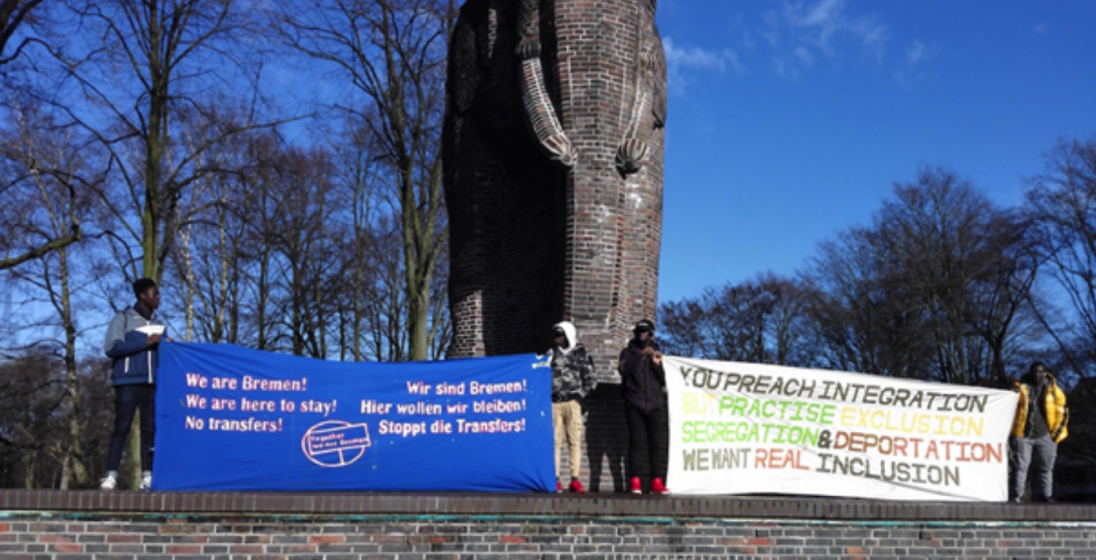How colonialism still affects our everyday lives - And why we are going to stay in Bremen.
On the 19th of October 2019 Together We Are Bremen demonstrated and demanded papers for residency in Bremen, school places and the closure of refugee camps. What does all this have to do with (post)colonialism? Siaka Konteh explained this in the demonstration's first speech, next to Bremen’s “anti-colonial monument”.
Siaka Konteh: First of all, I will like to welcome all of you for coming out in your numbers. That is a very important demonstration, we are very happy to see you all here in your numbers, joining in solidarity.
Translator: Wir heißen euch alle herzlich willkommen, danke, dass ihr alle gekommen seid für diese super wichtige Demo für uns. Danke, dass ihr hier seid uns eure Solidarität zeigt.
Konteh: It has been a while we have not been in the streets. But we are here to, with a lot of determination, we are here to show that we are very much alive. We are very much strong and we are here in the street again to say that we want a better life for everyone here. We choose this place, the so-called anti-colonial monument. We think this is the best place for us to start our demonstration here. And I will give you a brief history of this place and the connection of this place to our present situation.
Translator: Wir haben uns länger nicht auf der Straße gezeigt, also wir haben länger keine Demonstration gemacht, aber heute sind wir wieder hier und wir sind entschlossener denn je. Wir sind hier mit denselben Forderungen, die wir schon die ganze Zeit haben. Für eine gute Zukunft, für uns alle, wir wollen hier bleiben, wir wollen Aufenthaltspapiere, wir wollen ein Bleiberecht. Ich werde anfangen, hier an diesem Ort zu sprechen und einen Bezug herzustellen zu diesem sogenannten Antikolonialdenkmal. Warum wir diesen Ort ausgewählt haben, als Start für unsere Demo und….
Konteh: The monster monument, that you can see with a glance behind you. It is not just a monument, this is a symbol of European colonialism that they still have here to celebrate their victory in Africa. This is a monument that means a lot to me and my fellow Africans who are in this... This is a monument that presents cruelty in its highest form, barbarity and exploitation in its highest form. That is why we choose this place today to start our demonstration.
Translator: Dieses Ding hier ist nicht einfach nur ein steinernes Denkmal, es ist ein Symbol. Es ist ein Symbol für europäischen Kolonialismus. Es ist ein Symbol für Gewalt, für Barbarei, für Ausbeutung.
Konteh: This monument reminds me of colonialism which still has an impact on my life, my everyday life. This is not a good sight for me, this monument reminds me of colonialism which determines - after 400 years ago - but still have a impact on my life, my everyday life. But we see this today here and these are reminders of colonialism. It is not only here, it is in the streets. We have streets that have been named after and glorified people who have exploited, who have enriched Europeans at the detriment of Africans.
Translator: Das ist kein guter Ort für mich, denn es ist verbunden mit einer 400-jährigen Geschichte vom Kolonialismus, mit einer Geschichte, die mit Sklaverei begonnen hat und einer Geschichte vom Kolonialismus, Post-Kolonialismus, die sich bis heute auf mein Leben auswirkt, tagtäglich.
Konteh: I will tell you Europe, Africa was a hotspot and Africa was like a hot cake that was divided, that European powers scrambled to have their fair share of this cake. That is why we are here today, that is why the inequality continues. Even after the Africans have a so-called independence. But still Africa in the essence is not independent. Still Europeans have influence, still they continue to exploit the natural resources of Africans. Still Europeans are watching this and while we are here to denounce this, to show our stand against this monument here, that we don't want to see this kind of structures. It reminds us of 400 years ago when Africa was divided, when Europeans had their fair share of this land. A piece of land, a fertile land that they used to exploit and loot all of the resources of Africans and to the Africans and their numbers. They cross the Sahara, the Mediterranean, the Sahara, the Mediterranean with the waves that many people have find their untimely death in these place. But this is all connected to history why people are migrating today is because of what happened 400 or so years ago.
Translator: Der afrikanische Kontinent war wie ein großer Kuchen, von dem sich alle europäischen Mächte ein Stück abgeschnitten haben. Und auch mit der sogenannten Unabhängigkeit sind die Länder nicht wirklich unabhängig geworden, denn der Einfluss auf die politische, die Politik, der Einfluss, sich die natürlichen Ressourcen weiterhin zu nehmen, wie es eben so passt. Das geht bis heute weiter und von dem Kontinent wird all das genommen was gebraucht wird, die fruchtbare Erde wird ausgenutzt, und all diese Zusammenhänge, diese Strukturen führen doch dazu, dass sich so viele Menschen auf den Weg machen müssen, durch die Wüste gehen, durchs Mittelmeer müssen. Das alles hängt zusammen und genau über diese Strukturen muss ich heute hier sprechen, wollen wir heute sprechen.
Konteh: It is not a very sweet topic, it is not a very easy topic and not many people want to learn from it but this is history. If we fail to adhere to history or we fail to learn our lessons on history we are doomed to repeat it.
Translator: Es ist kein leichtes Thema über das wir heute sprechen und wir erleben immer wieder wie wir dazu verdammt sind, dass sich diese ganzen Geschichten wiederholen und wiederholen.
Konteh: For some of you Germans, this is like a big structure here behind me. But for me it is not that, it have an impact on my future and the future of even unborn generations which, as a German, as a European, you failed to recognize the importance of this, or you don't want to be reminded of these structures of colonialism we have here. As an African child who have been dropped out of school because he could not pay for his school fees, as an African who have to go through the mediterranean because he wants a better live for himself, as an African who get dropped out the system, who have been through
Gottlieb-Daimler Strasse camp because of this colonialist system and who have been here and maltreated: this is a big thing, this is a big reminder but as a German here with all the privileges you have, maybe you could decide to have a deaf ear to this here. But I am going to say this, we are very much going to criticize this. And we don't want these structures here again. We say this is a symbol of exploitation and still this is connected to here, our fight that we have here.
That colonialism, that white supremacism, that imperialism still continue to interfere in the politics and economics of African countries. That's why today Africans have migrated in their large numbers to Europe but still Europeans are closing their doors. There is no welcoming, there are people who are saying “The boat is full”. Which boat is full? - I have to ask.
Translator: Das ist kein leichtes Thema für mich, hier, an diesem Ort. Diese Strukturen bestimmen meine Zukunft, sie bestimmen unsere Zukunft und sie bestimmen die Zukunft der Generationen, die noch nicht mal geboren sind. Als Afrikaner, der durch das Mittelmeer kommen musste, der durch die Wüste flüchten musste, der hier im Lager leben musste und dann einfach aus dem System gekickt wird. Ihr hier, ihr Deutschen habt eure Privilegien, eure Zukunft sieht anders aus, aber wir müssen für unsere Zukunft kämpfen und das werden wir auch.
Konteh: I will like to draw connection on colonialism, on post-colonialism, on the contemporary politics that we have here today. When Europeans went to Africa. The first thing they did was, they took the land of Africans, to enrich themselves and the sovereignty of Africans was taken away from them. Today, we as Africans here, we face different challenges here, we are not welcomed. Laws have been tighting. By everyday, by every minute, they try to send us away. But we say: we are not going anywhere. You destroyed our countries, we are here, we are going to live here and we are not going anywhere.
Translator: Und das ist dieser Zusammenhang mit Kolonialismus und Post-Kolonialismus. Das eben die Europäer nach Afrika gegangen sind und die Souveränität der einzelnen Länder sich einfach unter den Nagel gerissen haben und wir kommen heute hierher und sind nicht willkommen. Aber wir bleiben hier, wir gehen nirgendwo mehr hin, wir bleiben hier.
Konteh: And this is, like, too connected to the present situation. Also when Europeans went to Africa. Africans have been denied education. When we look at the present condition here, the situation here, we are denied education yet again. This is history repeating itself. When Europeans went to Africa, Africans were denied education for 400 years. I will take the example of Gambia, the British did not build any schools for Gambians, they want to deny them the chance to go to school. And we come here now, in the present day, we are denied the chance to go to school. That's why we have to connect it, we want to go to school, we want to learn, we want to build a future, we want to be something in the future and we want to go to school. Now we are sending this message to the ministry of interior that we all want school places, we want to learn, we will not allow history to repeat itself.
Translator: Wie man es in afrikanischen Ländern immer wieder erlebt, dass es uns, dass es nie erlaubt wurde, zur Schule zu gehen vor 400 Jahren und auch immer noch bis heute. Und auch hier erleben wir wieder, dass wir keinen Zugang zur Schule und zur Bildung bekommen und einfach nicht lernen dürfen und uns nicht das nehmen dürfen, was wir brauchen und deswegen sind wir heute wieder hier.
Konteh: It is very important, we have to emphasize this demand, we want to go to school, this is a very demand, we will emphasize a lot. We want school places and to go for there is like to say: All this have been connected to the exploitation. And the living conditions we are living here are very synonymous to what have happened 400 years ago. That we are still living in camps, we live overcrowded rooms. These are all synonymous to what happened 400 years ago. We want to say everything that will remind us of colonialism, will remind of what European did in Africa in those dark days. We don't want this. That is why today we say: We don't want any camplife again, we don't want to live in overcrowded houses, we don't want to live in a place where we will have securities around us, we don't want to be enslaved once again.
Translator: Und darum ist es eben eine ganz zentrale Forderung von uns. Wir fordern Bildung, wir wollen endlich zur Schule gehen können. Wir fordern, dass wir endlich würdige Lebensbedingungen hier bekommen. Denn überall sehen wir diese parallelen Strukturen, dass wir schon wieder in Lagern leben müssen, dass wir in überfüllten Gebäuden zusammen leben müssen, dass wir hier auf eine Art und Weise leben müssen, die einfach nicht lebenswert ist. Das muss endlich aufhören, diese Lagerleben ist, das kann nicht weitergehen. Es muss aufhören, stop damit. Es ist auch genug, dass wir immer weiter hier versklavt werden, schluss damit!
Konteh: We say we don't want this again, we want to live in dignity, we want to live in a place where will have a peace of mind. We want to get into the society and be here and have a better future, that is all we want here. We don't want anything that is, that will remind us of this monument we have behind us, the history of it. We want a better life, that is why we are fighting, with your solidarity we can fight this, we want all imperialist empires to crumble down to their knees.
Translator: Wir fordern ein Leben in Würde, wir fordern ein Leben, in dem wir einfach endlich irgendwie zur Ruhe kommen, damit unsere Köpfe, unsere Seelen, unsere Psyche zur Ruhe, zur Ruhe finden. Wir fordern eine Zukunft. Wir wollen überhaupt nichts besonderes oder Ungewöhnliches, wie es nicht auch jede andere Person fordert oder braucht. Dafür brauchen wir Solidarität.
Konteh: I will like to say one point on the deportations and everything that happens with the police and the situation in the Mediterranean that still Africans have untimely deaths. There was a time when Africans have untimely death on the Atlantic also, when Europeans force them to come to their plantations and build their countries. Like this also will still have untimely deaths because there is no rescue. We can fight against this, to see that there is rescue and rescue should not be a crime in the Mediterranean.
Translator: Ich will noch was zur Abschiebung sagen, und ja, zur Situation im Mittelmeer. Wir erleben heute wieder, wie unzählbare afrikanische Menschen ihr Leben im Mittelmeer… ihren Tod finden, weil sie von europäischen Ländern nicht gerettet werden, weil genau diese Rettung unterbunden und nicht möglich gemacht wird. Das ich eine Verbindung zu den unzählbaren toten afrikanischen Menschen auf Plantagen der Europäer, wo sie ausgebeutet werden.
Konteh: I will like to conclude here, to say: let them stop the wars, let them stop destroying our countries, let them stop exploiting our countries, let them stop interfering in our internal politics, let them stop killing our visionary leaders, let them stop the exploitation - the economic and everything they are doing. If they stop, there will be equality. But in as much as there is no equality, in as much as the gap is getting wider every day. People will migrate everyday and we will migrate, we are going to come to get our share of the cake.
Translator: Sie sollen mit ihren Kriegen aufhören, sie sollen aufhören, unsere Länder zu zerstören, sie sollen aufhören, sich politisch einzumischen, sie sollen aufhören, uns wirtschaftlich auszubeuten. Und diese Kluft, denn diese Kluft, die all das produziert, wird tagtäglich größer, tagtäglich müssen Menschen migrieren und das muss aufhören. Schluss mit all dem!
Konteh: This one to my African brothers. I will like to say, our ancestors have been put in shackles, they have been chained. But now it is you here. Not let them colonize our minds, let's be free to think, let's be strong to fight to see that our rights and dignity is being respected. We are not getting it on a silver plate, we have to fight for it. It is not an easy fight but we have to be determined and strong to fight. If we look at our conditions and situations - and still we have the courage to stand here. To voice our opinions, to say we are not going to be silent anymore to continue the fight and the struggle. There will be victory, I assure you we will win this fight.
And for those who have come here to join in solidarity: you don't expect any tap on the back but we appreciate your solidarity and your support. That we can do this together when we stand together we can fight and we can win this battle together. And this world will be a better place for all of us and we can leave a legacy that will live for eternity. I thank you all.
Translator: Rassismus kolonisiert unsere Gehirne immer weiter. Dagegen müssen wir kämpfen und es macht es auch schwer, wir werden es nicht auf dem Silbertablett serviert kriegen, wir müssen dafür kämpfen und das ist hart. Doch gemeinsam schaffen wir das, wir brauchen Solidarität und gemeinsam können wir etwas erreichen, und zwar eine bessere Welt für alle.




